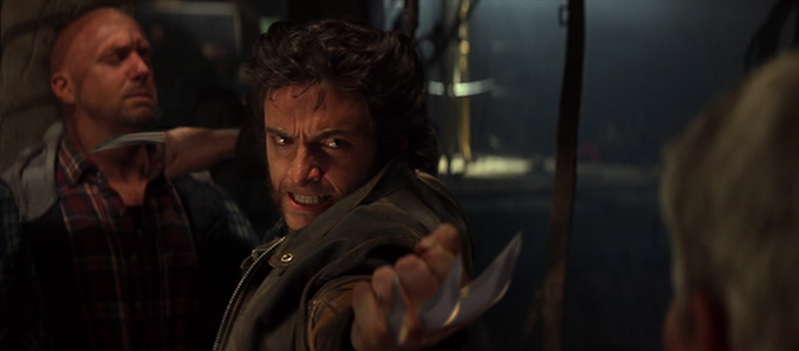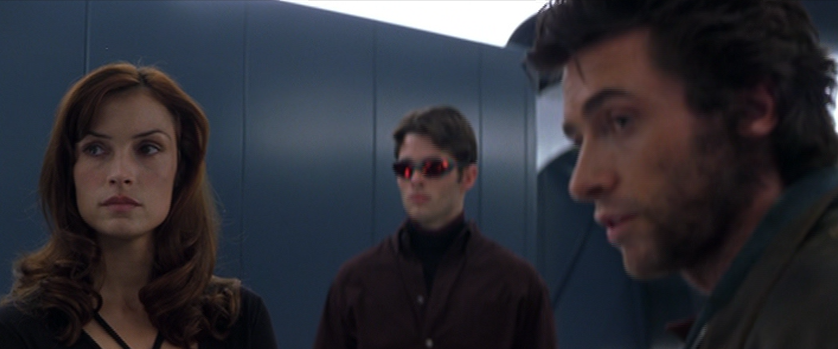

“Why do you ask questions to which you already know the answer?”
The X-Men have always held a special place in my murky mental pantheon of pop culture icons. The spandexed heroes’ outsider status and unconventional heroism resonated with a young boy in a way that the protective overlording of a hero like Superman did not. I have many fond memories from childhood involving the characters: their brief, teasing presence in an episode of Spider-Man and His Amazing Friends (“A Firestar is Born”) that we had on a copied VHS tape, worn out from endless replays; becoming enthralled by episodes of X-Men: The Animated Series watched completely out of context before I understood television programming; using all of my Chuck E. Cheese tokens on the delectable six-player cabinet arcade game; the large cast of new-to-me heroes in X-Men: Legends. I even had an encyclopedic compendium that detailed the history of basically every Marvel character in existence that I would spend hours just browsing. This was made for twelve year old me.
By the time the twenty-first century rolled around, comic book heroes had proven themselves ripe for cinematic adaptation, even if “the formula” hadn’t quite been ironed out yet. These things weren’t surefire moneymakers—as evidenced by the colossal dud of Batman & Robin which threatened to tank the entire fledgeling genre—but there was certainly a market for them that was larger than the sum of all the comics geeks. The problem was that studios weren’t quite sure just how to balance the campy origins of these characters with the serious tone required of a live action adaptation. To please the nerd and the average movie attendee alike they had to hew close enough to the source material to prevent accusations of blasphemy while also avoiding a devolution into campiness—not an easy task when you have characters with names like Sabretooth and Cyclops. Further compounding the risk in adapting the X-Men for the masses is the fact that there’s not really a main character. Wolverine is the quintessential X-Man, but after that it’s a step down in terms of name recognition, while the central conflict is personified by the relationship between Professor X and Magneto. That’s quite the challenge compared to making a cinematic origin story for Superman or Batman.

The lack of a culturally ubiquitous main character was the main hurdle to clear for director Bryan Singer and writer David Hayter. In order to jam a compelling story featuring a dozen canonically established characters into two hours, the duo are basically forced to start the film with an existing team of X-Men in the midst of conflict. The focus is understandably placed on Wolverine (Hugh Jackman), the most iconic of the X-Men, but ample screen time must also be dedicated to establish Charles Xavier’s (Patrick Stewart) School for Gifted Youngsters, to flesh out the rest of the existing team that Wolverine will be joining—Cyclops (James Marsden), Storm (Halle Berry), Jean Grey (Famke Janssen)—and to elucidate the existing decades-long relationship between Professor X and Magneto (Ian McKellen). It’s a big ask to cram all of those things into a feature length film that is both compelling enough to be self-contained but broad enough that it can open a pathway to a franchise. Somehow, they make it look pretty easy.
X-Men walks the tightrope with dexterity. It pulls off a dark prologue at the gates of Auschwitz to set the serious tone, and cleverly has the X-Men engage in some self-reference at their own expense (“Well, what would you prefer, yellow spandex?” “This certainly is a big round room.”) to balance things out. While the entire series kind of developed into a vehicle for Jackman’s hugely popular portrayal of Wolverine, it kicks off not with his origin story—that would have to wait until 2013’s X-Men Origins: Wolverine—but with a brief look at young Erik Lehnsherr, who, as a child, was separated from his parents at a concentration camp. Lehnsherr becomes Magneto, so the film actually begins by giving the audience a very compelling reason to sympathize with the villain. And this central conflict, I think, is what makes X-Men a compelling watch instead of just another forgettable popcorn muncher.

We soon find ourselves in Congress, where Senator Robert Kelly (Bruce Davison) is attempting to pass the Mutant Registration Act, which would force mutants to reveal themselves and have their identities and abilities documented. Jean Grey presents her case in opposition but the crowd seems to back the Senator. Professor Xavier and Magneto are both in attendance and their paths inevitably cross. Xavier holds out hope that humans and mutants can exist together in peace, but Magneto senses a brewing war in which all the mutants would be better served to come together in opposition to any sort of governmental oversight. I find this premise to be very intriguing because it doesn’t paint things in broad, black and white strokes. We are certainly meant to root for the X-Men—the story is told from that angle, the costumes and make up of Toad (Ray Park) and Sabretooth (Tyler Mane) are physically ugly, Wolverine gets all the humorous lines—but from a rational perspective, both Magneto and the Senator have more sensible outlooks than the idealistic Professor X. Indeed, I think, if the story were told through Magneto’s eyes, one could easily side with him. This division of sympathies makes it possible for Magneto’s Brotherhood of Mutants to occasionally ally themselves with the X-Men in the comics which makes for dynamic storytelling.

The most fortuitous casting choice was clearly Jackman, who only had a handful of films under his belt at that point, and, according to the film’s Wikipedia page, seems like he was the eleventh or twelfth choice for the role. But he completely nails the tone, the mannerisms, and the irreverent attitude of the character. It’s almost impossible to imagine someone else as Wolverine (Russell Crowe? Glenn Danzig??). Patrick Stewart and Ian McKellen are both stellar, while the rest of the cast hold their own but do not stand out—except Halle Berry’s quasi-African accent is… uh, it’s really something.
There’s obvious social subtext baked into the persecution of the mutants which becomes more explicit in X2. While the character of Wolverine soaks up so much of the attention that the ensemble feels more like a supporting cast, the script does a great job of keeping the entire “species” of mutants as the focal point. We are in an age now where every superhero film seems to up the ante, requiring saving the country, saving the world, saving the universe—to have the climax atop the Statue of Liberty with only a single city at stake is kind of refreshing.1 And, if Magneto had succeeded in his plot, these people would survive, they’d just be mutants (which kind of makes the social subtext a little bit challenging to think about).
X-Men is far from perfect, but it does a great job of establishing the norms and boundaries that have guided superhero filmmaking in the ensuing decades. It strikes a semi-serious tone that many subsequent films have copied. It only occasionally stumbles as it self-consciously discovers a storytelling method that allows you to take the heroes seriously while barely batting an eye at the conjuring of lightning, laser beams shooting from eyes, and claws jutting from hands. It’s easy to have fun with because it never gets too caught up in its own significance and succeeds because it puts our outcast heroes in a narrative that involves them rather than revolving around them.
1. X-Men had six months shaved off its production schedule when Steven Spielberg’s Minority Report was delayed so that he could direct A.I. Artificial Intelligence in the wake of Stanley Kubrick’s death. Fox chose to bump X-Men up to fill the hole. So it’s likely that some explosive action scenes had to be cut from the film in order to wrap early.
I learn something new on various blogs everyday. It is always stimulating to see content of other writers and learn a little something from them. Thank you for sharing.
I was just chatting with my coworker about this film today at Outback Steakhouse. Don’t remember how in the world we landed on the topic, maybe they brought it up. I do recall eating a excellent fruit salad with cranberries on it. I digress.
A very fine read!